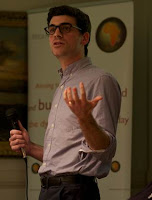This week is UN Global Goals week, an annual week of action where the United Nations and partners from around the world come together to drive action, raise awareness and hold leaders to account in order to accelerate progress to the Sustainable Development Goals (SDGs), also known as the Global Goals.
Dr Sean Fox, Senior Lecturer in Global Development at the University of Bristol’s Cabot Institute for the Environment, recently interviewed me about why I support the Sustainable Development Goals. You can read the transcript below.
SF: You’ve been a vocal supporter of the Sustainable Development Goals, when some mayors don’t talk about them. Why do you think they’re important?
MR: I think it’s important to talk about them because we often fall victim to the stereotype of thinking the SDGs are for the global south, when actually the SDG themes clearly cross over. For example, take Water. It’s a northern hemisphere issue as well. The challenges may not be as extreme as in sub-Saharan Africa or Asian countries, but it is increasingly an issue for us with Climate change and migration.
But then the other thing is really making sure this is not just about national governments. In fact if you leave it to national governments we’ll fail, because they don’t cooperate they contest. They have hard borders. They don’t talk about interdependence like we do at the city level. We share a population in Bristol with so much of the rest of the world and we need to work as though that is true, because our population here cares about the population there. The SDGs are real and raw in the Northern and Southern hemisphere as well as within families.
SF: How can the SDGs be beneficial for Bristol?
MR: We are trying to build a global network of cities through the Global Parliament of Mayors and that involves coming up with a common language. The SDGs can be that language. There’s a proposition that national governments are failing in everything from climate change to migration, inequality and health, and it’s a failure of national policy. But it’s also a failure of a global governance structure that is overly dependent on nations. We urgently need global governance to move into its next iteration, with international networks of cities working and sitting alongside national leaders as equal partners in shaping international and national policy. We’re trying to change the architecture.
However, if we want these international networks of cities to work, we have to be able to talk to each other. One of the things that bonds mayors at a mayoral gathering is their challenges: Rapid urbanisation, health and wellbeing, adequate housing, air quality, quality education, water supplies. All mayors face the same challenges. Mayors connect at these gatherings because we’re trying to do something. I think the SDGs offer language, images and targets around which a global network of cities could rally. We need to attach ourselves to them, and interpret the SDGs as they are relevant to our local area so we can deliver them locally and globally, even if our national governments are failing.
SF: National government also share common objectives. What is the difference between being a city leader rather than a national leader?
MR: One is the proximity of leadership to life. National leadership is much more abstracted from life. I met the mayor of Minneapolis and she told me they had the largest Somali community outside of Somalia. Then I was in a taxi with a Somali taxi driver, and I was talking about this and said ‘I was in Minneapolis, there’s a big Somali community there’. He said ‘I go to Minneapolis regularly, my family are there!’ So a Bristolian lives here, but he also lives in Minneapolis because his family are there.
Now we don’t govern like that, but he lives like that. We’re a city with a global population, so there’s a vested interest in cities looking out for each other’s interests because they share populations, families, and remittances flows. There must be someone in Somaliland that wants Bristol to do well and there must be someone in Bristol that wants Somaliland to do well because that’s thier cousin, that’s their gran. I want Jamaica to do well, I want Kingston to do well.
Additionally, cities are better placed to recognise their interdependence. Nations may recognise their interdependences but they’re always drawn to borders, competing GDPs and trade deficits. It seems to be a much more a zero sum game.
SF: Why should UK mayors bother with Global Goals and networks? Why not just focus on Bristol?
MR: Often politicians offer to purchase your vote with promises. I don’t like that. It needs to be what are we going to do. We should be a city that wants to change the world, all cities should! We should want to deliver on the SDGs not just for Bristol but for the world, even if you don’t have family elsewhere, because we’ve got to save the planet. I think it’s pretty clear. We need to be delivering against the SDGs as part of our global responsibility in an interdependent world.
———————–
This blog has been reproduced with kind permission from Marvin Rees and Bristol Mayor’s Office. You can view the original interview here.
Marvin Rees is the Mayor of Bristol. He leads the city council and its full range of services – from social care to waste collections. He also performs a broader role representing the interests of Bristol’s citizens on a national and international level.
 |
| Marvin Rees |
 |
| Dr Sean Fox |
Dr Sean Fox is a member of the University of Bristol’s Cabot Institute for the Environment and a Senior Lecturer in Global Development.
This is the second blog in our #GlobalGoals series as part of Global Goals Week 2018. Read the other blogs in the series:


